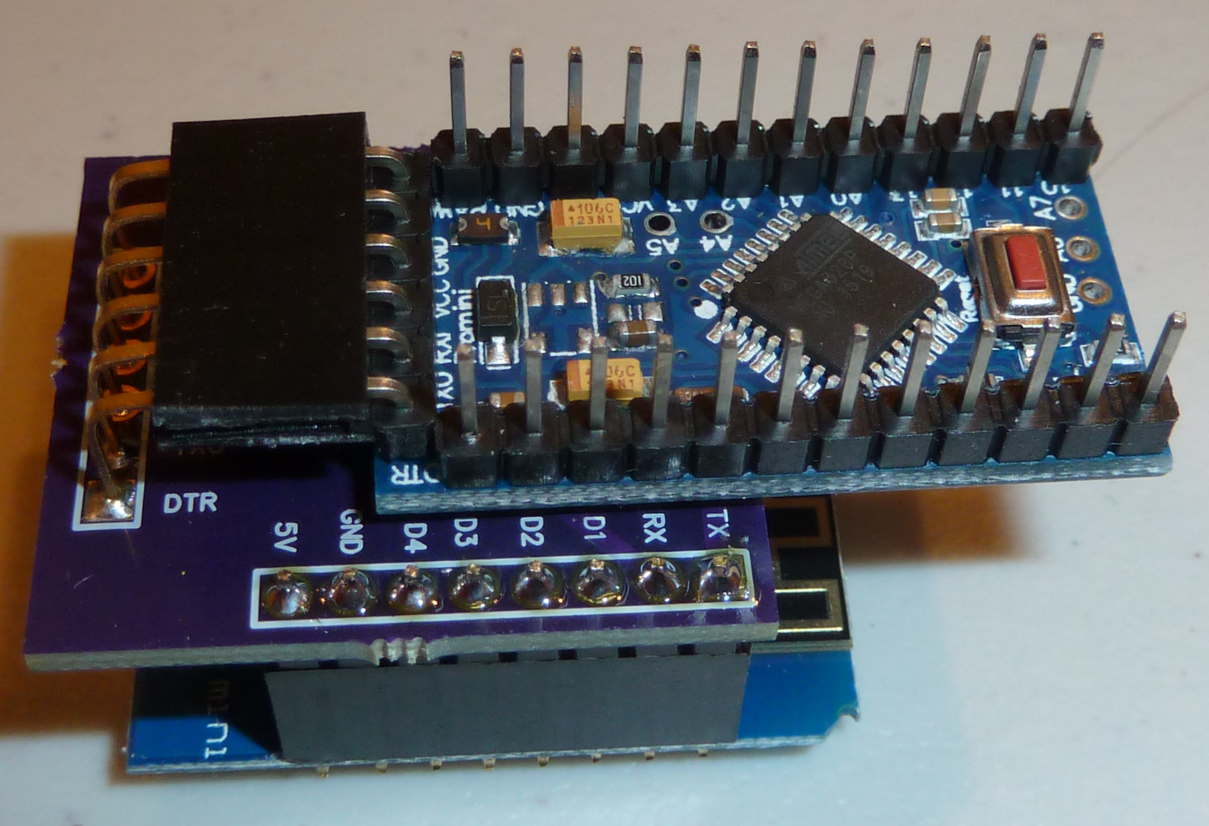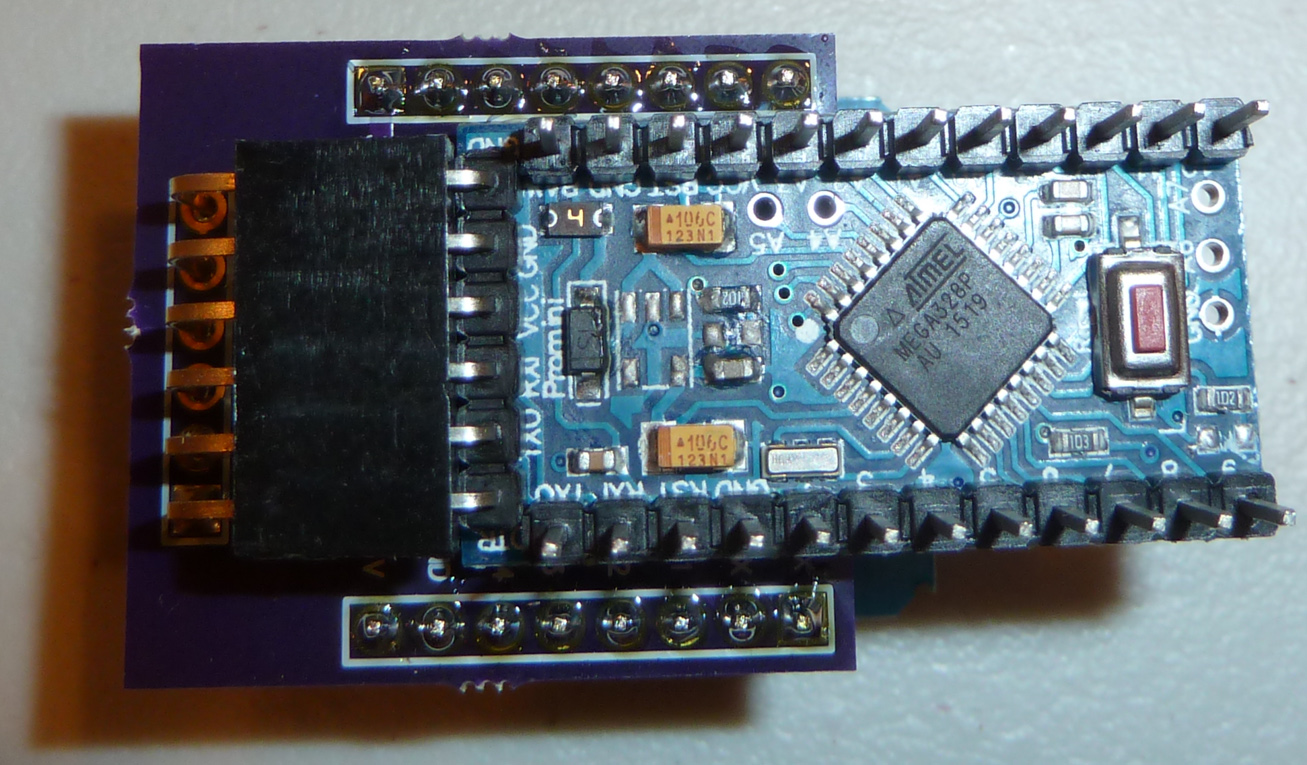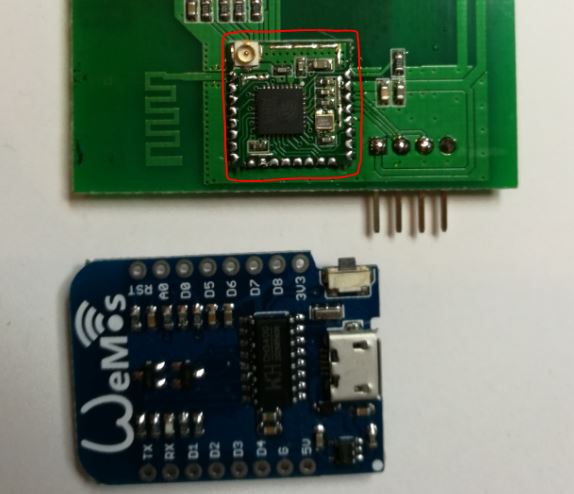💬 ESP-LINK ESP8266 WeMos D1 Mini Adapter Board
-
@NeverDie
I use personally different types of mics. Wireless mic, my mobile phone (there is a extra android app availabe "VoxWav") and also a smartwatch (Omate). I have no experience with an microphone array but some user using a boundary mic. Here are a interested post from our forum about the Echo. -
Just now released Version 004. Changes in Version 004:
- Corrected spacing between rows of pins to fit the Wemos D1 Mini.
- Enlarged drill holes to make inserting and aligning header pins easier.
- Rotated FTDI header 180 degrees.
- Added a ground pour.
- Vias eliminated.
I just now ordered new Version 004 boards from the fab. This project will remain a "Work in Progress" until I receive them and can verify that everything is fitting correctly and working as it should.
-
@fets said:
@NeverDie said:
So, I decided to order some of those instead.
Which one did you order ? Can you provide the link please ;)
I ordered it from:
https://www.aliexpress.com/item/1PCS-D1-mini-V2-Mini-NodeMcu-4M-bytes-Lua-WIFI-development-ESP8266-by-WeMos/32754697134.html?spm=2114.13010608.0.0.zAagkaWhereas this link explains it better:
https://www.aliexpress.com/store/product/D1-mini-Mini-NodeMcu-4M-bytes-Lua-WIFI-Internet-of-Things-development-board-based-ESP8266/1331105_32529101036.html?spm=2114.8147860.0.0.DrTJYs@NeverDie said:
@fets said:
@NeverDie said:
So, I decided to order some of those instead.
Which one did you order ? Can you provide the link please ;)
I ordered it from:
https://www.aliexpress.com/item/1PCS-D1-mini-V2-Mini-NodeMcu-4M-bytes-Lua-WIFI-development-ESP8266-by-WeMos/32754697134.html?spm=2114.13010608.0.0.zAagkaCaveat emptor:The vendor I used (above) sent me version 1 clones, despite its photos showing Version 2 Wemos boards. What a rip off! From now on I'm ordering only direct from Wemos.
-
@NeverDie said:
@fets said:
@NeverDie said:
So, I decided to order some of those instead.
Which one did you order ? Can you provide the link please ;)
I ordered it from:
https://www.aliexpress.com/item/1PCS-D1-mini-V2-Mini-NodeMcu-4M-bytes-Lua-WIFI-development-ESP8266-by-WeMos/32754697134.html?spm=2114.13010608.0.0.zAagkaCaveat emptor:The vendor I used (above) sent me version 1 clones, despite its photos showing Version 2 Wemos boards. What a rip off! From now on I'm ordering only direct from Wemos.
@NeverDie don't forget to open a dispute, add a photo with the board you received and a v2 with clear text saying "Official Wemos v2 / picture on product page" and "Board received" as title, then make arrows to show the differences.
They are claiming to sell v2 so you would already not have too many problems to get your money back from aliexpress. But as they also claim it's "by Wemos" and what you received is not, it means they're selling fakes, full redund is only a few days away from your pocket.Tip: you can also discuss with the seller to make him admit it's not an official wemos board, then put a screen capture of the messages attached in the dispute.
-
I received the ESP-LINK board from the fab, and it fits together very easily. For illustration purposes, the photos below show it connected to a 3.3v 8Mhz pro mini


In this instance, the pro mini hovers over the ESP8266 antenna, which isn't ideal. I suppose one could mount the pro mini vertically so as to avoid that. However, I'm now thinking that mounting the FTDI connector at the front of the adapter board, and having the pro mini (or whatever is being connected to) hang in the opposite direction might be a better way to go. Doing that, the board could also be reduced in size by about 1/3.
Of course, for a permanent installation, one could just solder the pro mini direcctly to the adapter board, and then it wouldn't overhang quite so much. Or one could just orientate the plugs vertically (as in the example photos of the homemade version), and the pro mini itself could remain horizontal.
Anyone have any opinions regarding this, or is it a "don't care" issue? For example, which do you prefer: a horizontal (as shown) or vertical orientation for the FTDI connector?
-
What is the idea to connect an Arduino to an ESP8266. What are the benefits of an Arduino in comparison to an ESP?
From my understanding, an ESP is more powerful than an Arduino nano. -
Also, if you're doing something that's very sensitive to timing, you may want to have a dedicated mcu handling that aspect. The ESP8266 is effectively timesharing it's wi-fi duties with its other tasks.
-
I just now posted Version 7.
Changes from Version 4:
- Fixed a routing error that prevented OTA reset from working. Now connecting D6 of Wemos D1 Mini (i.e. GPIO 12 of ESP8266) to DTR.
- Fixed the overhang issue.
- Shrunk size of PCB
- Updated schematic.
- Changed pads to be square or round according to normal schematic convention.
For reference, here's a pinout of the Wemos D1 Mini:

-
I just received my D1 Mini "Pro," and it is a completely different design from the non-pro version. It only has SMD parts on one side of the board, not two as with the non-pro version. Furthermore, it doesn't use a metal encased ESP8266 module at all. Instead, it more or less implements the contents of a metal-can module on the board itself. In other words, Wemos vertically integrated the Pro version.
-
I just received my D1 Mini "Pro," and it is a completely different design from the non-pro version. It only has SMD parts on one side of the board, not two as with the non-pro version. Furthermore, it doesn't use a metal encased ESP8266 module at all. Instead, it more or less implements the contents of a metal-can module on the board itself. In other words, Wemos vertically integrated the Pro version.
It has also 16M bytes flash instead of 4M bytes and a CP2104 USB-TO-UART IC which is new, there is also a external antenna connector available.
Here are the product webpages if anyone is interested:
WemosD1 mini Pro: https://www.wemos.cc/product/d1-mini-pro.html
Wemos D1 mini: https://www.wemos.cc/product/d1-mini.htmlThe Wemos D1 mini Pro is slightly more expensive than the Wemos D1 mini
-
Just received mine and it's great as it's really thin now. They have moved the USB plug on the same slide than the components and every other component is thinner than that.
Not sure about the reception quality with the ceramic antenna but it could be a good improvement too.The problem is when you want to use the 16Mb. It's not supported by Arsuinonso you have to cheat. And it's not even supported by the read/write flash functions so you have to cheat also. In both cases you don't have full functionality for the 16Mb using Arduino...
-
Just received mine and it's great as it's really thin now. They have moved the USB plug on the same slide than the components and every other component is thinner than that.
Not sure about the reception quality with the ceramic antenna but it could be a good improvement too.The problem is when you want to use the 16Mb. It's not supported by Arsuinonso you have to cheat. And it's not even supported by the read/write flash functions so you have to cheat also. In both cases you don't have full functionality for the 16Mb using Arduino...
-
@NeverDie
Do you noticed also the PSF-A85 and PSF-A85 boards on the itead website?https://www.itead.cc/wiki/PSF-A85
https://www.itead.cc/wiki/PSF-B85These boards contain the new ESP8285. I have seen this ESP8285 (ESP8285 internal Flash is 1MByte = 8Mbit) in the Sonoff Wall-Touch-switch and it was easy to write a Arduino sketch to it with an FTDI programmer (FTDI prg. is only for the first time needed, after that you can update the sketch OTA).
The Board has only ~14mmx14mm - so it is possible to shrink "Wemos D1 mini" based projects.
Here are a picture to see the Wemos size vs. PSF-A85 (red square):
Kalle
-
@NeverDie said:
@Nca78
You're ahead of me. How much is supported?Sorry I didn't go much further than seeing there's some code to modify to cheat in the flash read/write methods to access it from the ic when running, and some other modifications in arduino IDE to be able to write to more than 4Mb. As I don't have a need for the extra storage at the moment I decided to pass :)
@kalle thank you for the link I didn't notice those before. Very interesting indeed as it's an ESP8266 with extra memory. With a small ceramic antenna similar to the one on the D1 mini pro it can make a really tiny
I just discover the wall switches too, they are nice but you need neutral wire (not surprising to be able to power esp8266) and it's not available for the switch type I have here US(AU) which is a bit smaller than standard US type :( -
@NeverDie said:
@Nca78
You're ahead of me. How much is supported?Sorry I didn't go much further than seeing there's some code to modify to cheat in the flash read/write methods to access it from the ic when running, and some other modifications in arduino IDE to be able to write to more than 4Mb. As I don't have a need for the extra storage at the moment I decided to pass :)
@kalle thank you for the link I didn't notice those before. Very interesting indeed as it's an ESP8266 with extra memory. With a small ceramic antenna similar to the one on the D1 mini pro it can make a really tiny
I just discover the wall switches too, they are nice but you need neutral wire (not surprising to be able to power esp8266) and it's not available for the switch type I have here US(AU) which is a bit smaller than standard US type :(@Nca78 I have tested both types of switches (EU/US) and they have both the same components inside - so maybe the EU wall switch will fit because it is even smaller. The price for such a switch is amazing (15$), but it is not glass on the top it is acrylic plastic.
-
@NeverDie
Do you noticed also the PSF-A85 and PSF-A85 boards on the itead website?https://www.itead.cc/wiki/PSF-A85
https://www.itead.cc/wiki/PSF-B85These boards contain the new ESP8285. I have seen this ESP8285 (ESP8285 internal Flash is 1MByte = 8Mbit) in the Sonoff Wall-Touch-switch and it was easy to write a Arduino sketch to it with an FTDI programmer (FTDI prg. is only for the first time needed, after that you can update the sketch OTA).
The Board has only ~14mmx14mm - so it is possible to shrink "Wemos D1 mini" based projects.
Here are a picture to see the Wemos size vs. PSF-A85 (red square):
Kalle
@kalle
Thanks for the links. Itead describes them as "ultra alow power," but I'm wondering: what's ultra low power about them? Aside from turning it off (500na), everything else doesn't seem ultra low power, at least compared to the usual atemega328p + nrf/rfm radio module that we're all used to on this forum.That said, I think the esp8266/85 actually could be made much lower power if it were possible (and it probably is, but I don't know how) to use its radio to simply broadcast a message without first linking to a router. Then, even if the power drain is high while active, it's active period could be kept so short that the energy drain would be quite manageable. Do you happen to know if there's a way to do that?
-
@kalle
Thanks for the links. Itead describes them as "ultra alow power," but I'm wondering: what's ultra low power about them? Aside from turning it off (500na), everything else doesn't seem ultra low power, at least compared to the usual atemega328p + nrf/rfm radio module that we're all used to on this forum.That said, I think the esp8266/85 actually could be made much lower power if it were possible (and it probably is, but I don't know how) to use its radio to simply broadcast a message without first linking to a router. Then, even if the power drain is high while active, it's active period could be kept so short that the energy drain would be quite manageable. Do you happen to know if there's a way to do that?
@NeverDie Itead said this chip is also for creating wearaible devices - so I think it is possible to use it with batteries. The ESP has a deepsleep function but I have no experience with it and don't know how it works - sorry. I have only "hacked" the Sonoff touch wall switch to use it without the terrible cloud app - I don't use it with the mysensors stuff, but maybe it is possible to use such a switch as ESPgateway node (the chip is powered with 3.3V) and we can try to upload the ESPgateway sketch on the switch.
-
@NeverDie Itead said this chip is also for creating wearaible devices - so I think it is possible to use it with batteries. The ESP has a deepsleep function but I have no experience with it and don't know how it works - sorry. I have only "hacked" the Sonoff touch wall switch to use it without the terrible cloud app - I don't use it with the mysensors stuff, but maybe it is possible to use such a switch as ESPgateway node (the chip is powered with 3.3V) and we can try to upload the ESPgateway sketch on the switch.
The deep sleep is good enough. What ruins the whole thing, though, is the fairly long re-acquaintance with the wi-fi router once it wakes up. That's where most of the power drain happens. If we could just drive the radio directly, then that problem goes away.
-
The deep sleep is good enough. What ruins the whole thing, though, is the fairly long re-acquaintance with the wi-fi router once it wakes up. That's where most of the power drain happens. If we could just drive the radio directly, then that problem goes away.
OK, I just noticed that it supports wi-fi direct (https://www.itead.cc/psf-a85.html), so perhaps that could accomplish it, since that doesn't require the lengthy wi-fi router dance.
The other strange thing is that Itead says its module supports 2x1 MIMO, and yet I see only one antenna port on it.
